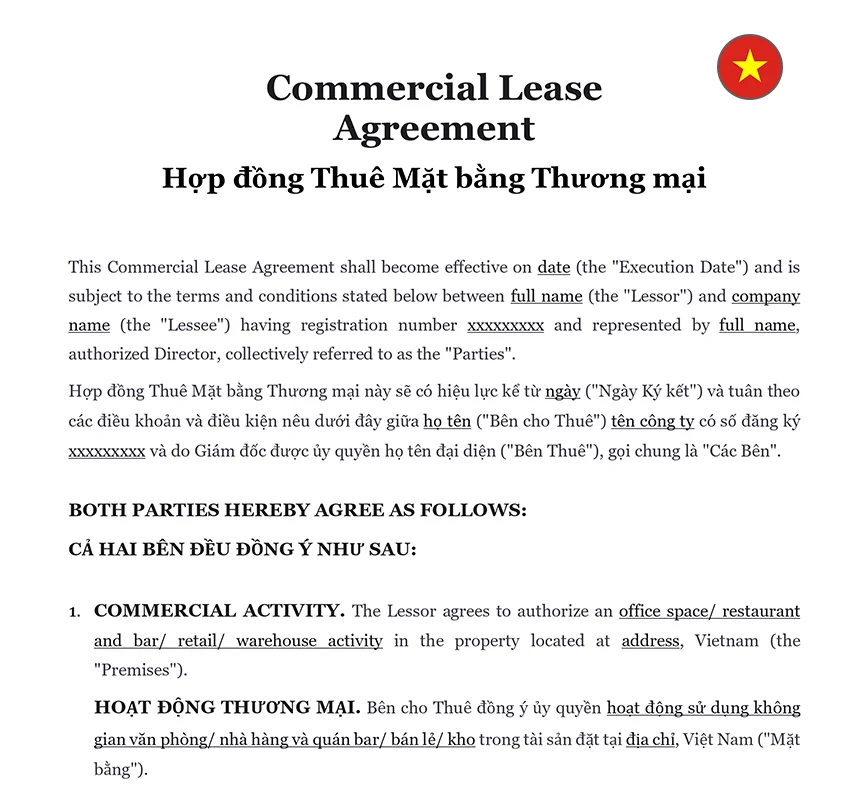Ready to use legal template
Drafted by experienced lawyers
Vietnamese-English translation
Ready to use legal template
Drafted by lawyers
Vietnamese-English translation
Home › Rent your property › Commercial lease agreement
Learn more about Commercial Lease Agreement in Vietnam
A Commercial Lease Agreement is a legally binding contract between a landlord and a business tenant, outlining the terms and conditions for renting commercial property. This agreement covers essential aspects such as rental payments, lease duration, maintenance obligations, and termination clauses, ensuring clear expectations and protection for both parties. In Vietnam, having a well-drafted Commercial Lease Agreement is vital for compliance with local property laws and business regulations. Whether you are leasing office space, retail premises, or industrial facilities, a comprehensive lease agreement ensures smooth business operations and legal protection. Download our Commercial Lease Agreement, easy to edit in Word format, professionally drafted in English and Vietnamese, tailored to meet Vietnam’s legal and business requirements.
Table of contents
-
What is the proposed lease term in Vietnam?
-
What is included in a Commercial Lease Agreement?
-
What are the rent payment terms in the Commercial Lease?
-
What are the maintenance and repair responsibilities?
-
Are there any restrictions on property use in Vietnam?
-
What are the provisions for lease renewal or termination?
-
What are the insurance requirements for a business rental?
-
What are the provisions for security deposits or guarantees?
-
Are there any additional fees or expenses?
What is the proposed lease term in Vietnam?
In Vietnam, the typical proposed lease term for a Commercial Lease Agreement varies depending on various factors such as the preferences of the landlord and tenant, the nature of the business, and market conditions.
However, it’s common for commercial lease terms to range from one year for short-term leases to five years for longer-term arrangements. Some landlords may prefer shorter lease terms to maintain flexibility and adaptability to changing market conditions or tenant needs.
Conversely, tenants seeking stability and long-term planning may opt for longer lease terms to secure their occupancy and potentially negotiate more favorable rental rates.
The proposed lease term is subject to negotiation between the parties involved, and it’s essential for both landlords and tenants to carefully consider their respective objectives and circumstances when determining the lease duration.
What is included in a Commercial Lease Agreement?
A commercial rental contract in Vietnam typically includes several key elements to ensure clarity and protection for both landlords and tenants. These elements may vary depending on the specific agreement, but common inclusions are:
1. Property Details
The property details describe the commercial property being leased, including its location, size, and any specific features or amenities.
2. Lease Terms
The lease terms are the duration of the lease, including the start date and end date. It may also include provisions for renewal or extension of the lease.
3. Rent Payment
Rent payment details the amount of rent, when it is due, and how it should be paid (e.g., bank transfer, cash, check).
4. Security Deposit
The security deposit includes the amount of the security deposit required, the conditions under which it will be returned, and any deductions that may be made from it.
5. Maintenance and Repairs
Responsibilities of the landlord and tenant regarding maintenance, repairs, and upkeep of the property.
6. Use of the Property
The use of property describes the permitted uses of the property and any restrictions on its use (e.g., no subleasing, no illegal activities).
7. Utilities and Services
Specification of which utilities and services are included in the rent (e.g., water, electricity, internet) and which are the responsibility of the tenant.
8. Insurance
Requirements for insurance coverage, such as liability insurance for the tenant and property insurance for the landlord.
9. Termination Clause
Conditions under which either party can terminate the lease early, and the process for doing so.
10. Dispute Resolution
Procedures for resolving disputes between the landlord and tenant, such as mediation or arbitration.
11. Renovation and Alteration
Whether the tenant is allowed to make changes to the property, and if so, under what conditions.
What are the rent payment terms in the Commercial Lease?
The rent payment terms in a Commercial Lease Agreement in Vietnam typically specify the frequency, amount, and method of rent payments. These terms are subject to negotiation between the landlord and the tenant and may vary depending on various factors such as market conditions and the nature of the commercial property.
The Commercial Lease Agreement may outline provisions for rent escalation, adjustments, or discounts over time. It’s essential for both parties to clearly define and agree upon the rent payment terms to ensure transparency and mutual understanding throughout the lease term.
What are the maintenance and repair responsibilities?
In a Commercial Lease Agreement in Vietnam, the maintenance and repair responsibilities are typically delineated between the landlord and the tenant. While specifics may vary depending on the agreement, generally:
1. Landlord Responsibilities
The landlord is usually responsible for major structural repairs and maintenance, including the building’s exterior, roof, foundation, and common areas such as hallways and stairwells. They may also oversee larger mechanical systems like HVAC (heating, ventilation, and air conditioning) systems and elevators.
2. Tenant Responsibilities
Tenants typically bear responsibility for day-to-day maintenance and minor repairs within their leased space. This includes tasks such as routine cleaning, interior upkeep, and repairing damage caused by their operations. Additionally, tenants may be responsible for maintaining and repairing any fixtures, equipment, or improvements they’ve installed within the leased premises.
Are there any restrictions on property use in Vietnam?
Yes, there can be restrictions on property use outlined in a Commercial Lease Agreement in Vietnam. These restrictions may include:
| ➤ Permitted Use: The lease agreement typically specifies the permitted use of the commercial property. This ensures that the tenant uses the premises only for the approved business activities outlined in the agreement. |
| ➤ Compliance with Laws: Tenants are usually required to comply with all applicable laws, regulations, and zoning ordinances governing the use of the commercial property. This includes adhering to health and safety standards, building codes, and environmental regulations. |
| ➤ Prohibited Activities: The lease agreement may prohibit certain activities or uses of the premises that could disrupt neighboring businesses or violate local ordinances. For example, activities such as manufacturing, excessive noise, or hazardous materials storage may be restricted. |
| ➤ Alterations and Improvements: Tenants may be restricted from making alterations or improvements to the property without prior written consent from the landlord. Any permitted alterations or improvements must comply with building codes and regulations. |
| ➤ Subleasing and Assignment: The lease agreement may include restrictions on subleasing or assigning the leased premises to third parties without the landlord's approval. This helps ensure that the landlord maintains control over who occupies the property. |




